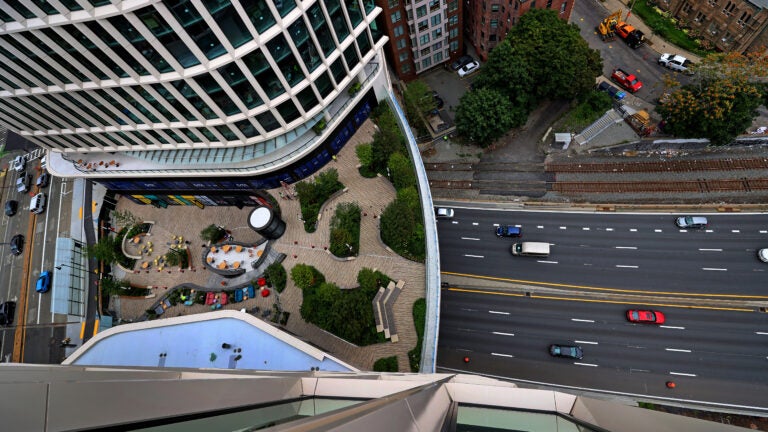Local News
The initiative aims to speed up the timeline of new buildings being required to go carbon-neutral.
Plans to speed up the construction of carbon-neutral buildings in Boston were stalled on Wednesday after the Zoning Commission failed to pass the Mayor’s Net Zero Carbon Zoning initiative.
The vote failed in a 6 to 4 count, needing seven to pass. The commissioners against the proposal cited worries that developers in the city are facing enough headwinds, with high interest rates and high material costs already stalling many projects.
In response to the vote, a spokesperson for the Wu administration said, “We plan to return to the Zoning Commission to address some of the concerns commissioners raised.” The administration hopes to bring back the Net Zero Carbon Zoning for another vote.
The vote was a surprise following the Boston Planning and Development Agency (BPDA) approval of the Net Zero Carbon Zoning vote this past June.
What the new zoning requires:
The new zoning would add sustainability requirements for development projects and speed up the timeline for meeting the city’s carbon-neutral goal from 2050 to 2025.
The city says buildings account for nearly 71% of the community’s carbon emissions.
The zoning would add a net zero emissions standard for new project filings after July 1 of next year for buildings with 15 units or more, a minimum of 20,000 square feet, or additions of a minimum of 50,000 square feet or more to existing structures.
Developers will demonstrate compliance with the new rules through the standard Article 80 review process. Small and large projects will be required to report on the amount of greenhouse gas emissions from the manufacturing, transportation, installation, maintenance, and disposal of building and infrastructure materials. Larger projects will also have a carbon emissions life cycle assessment.
The amendments would supplement state building codes and city ordinances, including the Specialized Stretch Energy Code and Building Emissions Reduction and Disclosure Ordinance (BERDO), which aims to make the city net-carbon-neutral by 2050.
Building owners under BERDO must report their annual energy and water consumption. Beginning in 2025 or 2030, owners must also comply with emission limits.
How the vote unraveled:
The vote began to unravel on Tuesday when City Councilor Edward Flynn submitted a letter against the zoning, saying he wanted more “robust community engagement” for the initiative.
Some commissioners worried that this additional burden would stall even more projects as the state faces an ongoing housing crisis.
Commissioner Michael DiMella questioned whether the new zoning would have tangible benefits that would significantly impact emissions. However, it will likely exacerbate the city’s current crises, such as housing, he said.
“We are going to continue to create this bifurcation of the city, where it’s going to be the haves and have-nots, and only wealthy people can live here,” said DiMella. “It’s going to reduce the equity throughout the city because the cost of housing is so high.”
Those in favor said that developers need more clarity on lowering emissions, especially as the city continues to get hotter and hotter due to climate change.
“The best tree planted was 20 years ago. The second best option is today. I think we need to plant our trees today,” said Commissioner Ricardo Austrich at the meeting. “I am supportive of this.”
NAIOP, the Commercial Real Estate Development Association, advocated for the city to reconsider the new initiative, given the city’s recent adoption of the municipal opt-in stretch energy code and the ongoing Article 80 modernization review process.
The additional burden, the organization said, would only slow down development projects in the city.
“NAIOP … hopes that the City will reconvene stakeholders from the regulated community to advise next steps in achieving our shared climate, housing, and economic development goals,” said Tamara Small, the CEO of NAIOP Massachusetts, in a statement.
City officials at the meeting say it’s unclear whether the zoning code would add new costs since new buildings are already subject to stringent requirements that encourage them to use less fossil fuels.
A recent report by Built Environment Plus, a green building advocacy group, found that Massachusetts has increased the number of net-zero and net-zero-ready buildings by sixfold in the last three years.
The report says that 80% of net-zero-ready buildings, including high-rise buildings, reported cost data that they were built at less than a 1% premium.
What local activists are saying:
Regardless of progress, Mothers Out Front and Boston Climate Action Network representatives spoke in favor of the new zoning.
“I think this is a good policy,” said Hessann Farooqi, the Boston Climate Action Network executive director, at the meeting. “It’s going to help us balance a few things, which is make sure that we can make our new constructions better while still making sure it’s cost-effective, while still making sure that we’re not slowing down the pace of development, especially current development.”
Farooqi added that it doesn’t make sense to allow new buildings to be built that 10 years from now will have to undergo costly retrofits to meet future emission standards.
“Since the first draft of this zoning code was completed, global carbon dioxide emissions have increased at a steeper rate than in all of human history,” said Andee Krasner of Mothers Out Front at the meeting. “We all have a responsibility to act, and we have to cut carbon as fast as possible, and we just don’t have that much time to make a difference.”
Boston.com Today
Sign up to receive the latest headlines in your inbox each morning.
